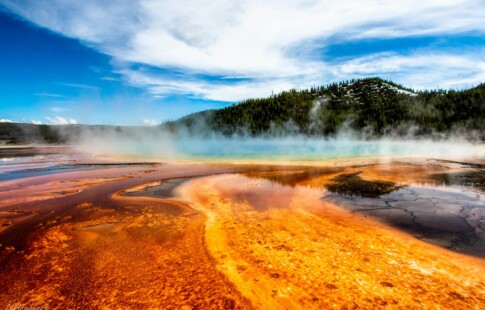
8 Environmental Science Jobs to Save the Planet
We are reader-supported. When you buy through links on our site, we may earn affiliate commission.
More people are pursuing environmental science to resolve our planet’s most pressing environmental issues. In 2020, universities across the United States conferred 9,339 environmental-related degrees — an annual growth of 5% for those entering these types of programs. Graduates have plenty of career paths to satisfy their passions upon entering the field — each position playing a crucial role in saving the planet. Those weighing a college education in environmental science might consider one of these eight environmental science jobs.
1. Environmental Scientist
Of course, environmental science education prepares individuals for careers as environmental scientists. However, the term itself can be rather broad.
Environmental scientists leverage their background in natural sciences to safeguard the planet and human health by cleaning and monitoring polluted ecosystems, advising legislators, and working in various waste management or other eco-related industries.
Professionals are adept in data collection and analysis, often responsible for reading water, air, and soil samples to determine pollution levels. They might also conduct hazardous risk analyses for potential threats to human health.
Environmental scientists usually work at government agencies, private corporations, research firms, university laboratories, and outside in the field.
The median salary for environmental scientists is $57,077, but experienced professionals could earn over $78,000.
2. Environmental Toxicologist
Environmental toxicologists apply biological, chemical, and epidemiological principles to study toxic pollutants and their effects on human health.
Toxicologists might also explore possible pollution sources to minimize adverse outcomes for humans and wildlife, such as inorganic and organic waste, pesticides, and heavy metals.
Environmental toxicologists usually assist with risk assessments, pharmaceutical studies, food testing, regulatory compliance, field sampling, and environmental health.
You can earn an average of $110,890 annually as an environmental toxicologist, while those on the higher salary grade make about $569,924.
3. Water Resource Manager
Approximately 56% of Americans are highly concerned about pollution in their drinking water supplies — and rightfully so.
According to the Environmental Integrity Project (EIP), 51% of U.S. waterways — 700,000 miles worth — are polluted or impaired to the point where they’re deemed unsafe for swimming or fishing.
Water resource managers are responsible for maintaining quality control within our most precious water resources.
The primary responsibilities of a water resource manager include
- Developing water conservation plans
- Analyzing clean water supplies in treatment plants
- Implementing and approving sustainable water uses
- Researching local water regulations
- Planning water diversion programs
- Educating the public
Water resource managers make about $88,448 annually and might work for government agencies, engineering services, or nonprofit organizations, such as watershed conservation groups.
4. Agricultural Scientist
Agricultural scientists are critical to ramping up the nation’s food supply through experimenting and researching sustainable crop and livestock farming approaches. They might also develop new food products and streamline sustainable packaging and delivery of goods.
Food scientists consult with the scientific community, government agencies, producers, and citizens about their findings to boost food production safety. Others develop and implement green technologies to improve farming sustainability.
Some agricultural scientists specialize in soil biology to protect soil fertility and promote higher crop yields. Throughout recent years, soil health has declined due to conventional farm management, such as runoff pollution, monoculture cropping, and nutrient depletion.
Agricultural scientists earn between $59,046 and $91,327 annually, depending on location, education and experience.
5. Recycling Managers
The United Nations Environment Programme (UNEP) estimates that only 10% of the 7 billion tons of generated plastic is recycled.
In the U.S., the recycling rate has fallen from 8.7% in 2018 to 5–6% in 2020. Many people don’t know what’s recyclable and what isn’t, as programs are few and far between to make residential recycling more standard.
Recycling managers provide a solution by developing community recycling and education initiatives and hazardous waste management programs. They also oversee the recycling facility operations, including drop-off programs and compliance.
Recycling managers might coordinate recycling collections and driving routes, prepare customer billing for recycling services and negotiate contracts and costs for effective waste management.
The national average salary for recycling officers is $51,871, but those on the high end earn upwards of $111,500 annually.
6. Air Pollution Analyst
Following widespread COVID-19 stay-at-home mandates, global carbon dioxide (CO2) emissions increased to their highest level ever at 6% or 36.3 billion tons.
Human-induced greenhouse gas emissions are the leading cause of global warming and poor air quality — a key indicator of climate change.
Air pollution analysts are highly skilled environmental experts who sample air pollution levels and draw reports to advise government agencies about safer air quality. They might be employed with private companies, inspecting buildings or residences for asbestos and other toxic pollutants.
Air pollution analysts also develop environmental air quality compliance standards and coordinate restoration and remedial programs.
Forecasts predict an 8% growth with over 7,000 job openings for this position between 2018 and 2028 in the U.S.
7. Sustainability Officers
Consumers are driving a significant shift toward greener business practices by transitioning to eco-friendly products. Studies show that 85% of individuals have adopted sustainable buying habits in recent years. To keep up with the trend, numerous companies have implemented sustainability initiatives to reduce their carbon footprint.
Sustainability specialists and chief sustainability officers work with companies, private firms and agencies to coordinate energy efficiency and resolve corporate sustainability issues.
They might also consult and monitor a business’s efforts in developing eco-friendly conservation programs, such as waste reduction, recycling, carpooling, and smart building design. Expert consultants in sustainability generate reports, presentations, and proposals to make the plane ser adopt.
Sustainability specialists earn an average salary of $74,670 annually, while chief sustainability officers typically earn about $$179,520 annually.
8. Environmental Lawyer
Some people combine their environmental science background with a law degree.
Environmental lawyers have long held some of the most critical environmental science jobs meeting with clients, researching, and attending trials.
Generally, environmental lawyers defend and promote environmental legislation that protects natural resources and those impacted by environmental issues. They might represent low-income citizens exposed to lead in their drinking water or take on the nation’s largest fossil fuel corporations.
An environmental lawyer makes an average salary of $148,910, while forecasts predict a 9% increased career outlook.
Environmental Science Jobs are Critical for Making Progress
Those with environmental science jobs are advancing ecological protection and humankind through research and innovation. Regardless of what area of environmental science someone works, collective expertise and effort make a significant difference.
Share on
Like what you read? Join other Environment.co readers!
Get the latest updates on our planet by subscribing to the Environment.co newsletter!
About the author

Steve Russell
Steve is the Managing Editor of Environment.co and regularly contributes articles related to wildlife, biodiversity, and recycling. His passions include wildlife photography and bird watching.





